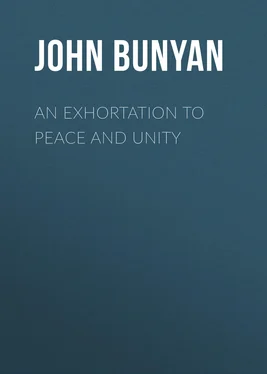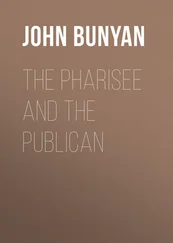John Bunyan - An Exhortation to Peace and Unity
Здесь есть возможность читать онлайн «John Bunyan - An Exhortation to Peace and Unity» — ознакомительный отрывок электронной книги совершенно бесплатно, а после прочтения отрывка купить полную версию. В некоторых случаях можно слушать аудио, скачать через торрент в формате fb2 и присутствует краткое содержание. Жанр: foreign_prose, foreign_religion, Философия, foreign_psychology, foreign_antique, на английском языке. Описание произведения, (предисловие) а так же отзывы посетителей доступны на портале библиотеки ЛибКат.
- Название:An Exhortation to Peace and Unity
- Автор:
- Жанр:
- Год:неизвестен
- ISBN:нет данных
- Рейтинг книги:3 / 5. Голосов: 1
-
Избранное:Добавить в избранное
- Отзывы:
-
Ваша оценка:
- 60
- 1
- 2
- 3
- 4
- 5
An Exhortation to Peace and Unity: краткое содержание, описание и аннотация
Предлагаем к чтению аннотацию, описание, краткое содержание или предисловие (зависит от того, что написал сам автор книги «An Exhortation to Peace and Unity»). Если вы не нашли необходимую информацию о книге — напишите в комментариях, мы постараемся отыскать её.
An Exhortation to Peace and Unity — читать онлайн ознакомительный отрывок
Ниже представлен текст книги, разбитый по страницам. Система сохранения места последней прочитанной страницы, позволяет с удобством читать онлайн бесплатно книгу «An Exhortation to Peace and Unity», без необходимости каждый раз заново искать на чём Вы остановились. Поставьте закладку, и сможете в любой момент перейти на страницу, на которой закончили чтение.
Интервал:
Закладка:
John Bunyan
An Exhortation to Peace and Unity
[We deem it proper to state, that, though the following Treatise of Christian Union appears in nearly all the collected editions of Bunyan’s Works, yet its genuineness has been called in question by the Rev. Mr Philip in his admirable work, “The Life and Times of Bunyan.” Without here entering into this question, we have separately appended it to the works of Bunyan in this volume, and trust that it will not prove unacceptable to our readers, especially considering the efforts that are now being made to promote the living union of all true Christians who hold the one Lord, the one faith, and the one baptism.]
Endeavouring to keep the unity of the Spirit in the bond of peace .
—Ephesians iv. 3.Beloved, religion is the great bond of human society; and it were well if itself were kept within the bond of unity; and that it may so be, let us, according to the text, use our utmost endeavours “to keep the unity of the Spirit in the bond of peace.”
These words contain a counsel and a caution: the counsel is, That we endeavour the unity of the Spirit; the caution is, That we do it in the bond of peace; as if I should say, I would have you live in unity, but yet I would have you to be careful that you do not purchase unity with the breach of charity.
Let us therefore be cautious that we do not so press after unity in practice and opinion as to break the bond of peace and affection.
In the handling of these words, I shall observe this method.
I. I shall open the sense of the text.
II. I shall shew wherein this unity and peace consist.
III. I shall shew you the fruits and benefits of it, together with nine inconveniences and mischiefs that attend those churches where unity and peace is wanting.
IV. And, lastly, I shall give you twelve directions and motives for the obtaining of it.
1. As touching the sense of the text, when ye are counselled to keep the unity of the Spirit, we are not to understand the Spirit of God, as personally so considered; because the Spirit of God, in that sense, is not capable of being divided, and so there would be no need for us to endeavour to keep the unity of it.
By the unity of the spirit then, we are to understand that unity of mind which the Spirit of God calls for, and requires Christians to endeavour after; hence it is that we are exhorted, by one spirit, with one mind, to strive together for the faith of the gospel; Phil. i. 27.
But farther, the apostle in these words alludes to the state and composition of a natural body, and doth thereby inform us, that the mystical body of Christ holds an analogy with the natural body of man: as, 1. In the natural body there must be a spirit to animate it; for the body without the spirit is dead; James ii. 26. So it is in the mystical body of Christ; the apostle no sooner tells of that one body, but he minds us of that one Spirit; Eph. iv. 4.
2. The body hath joints and hands to unite all the parts; so hath the mystical body of Christ; Col. ii. 19. This is that bond of peace mentioned in the text, as also in the 16th verse of the same chapter, where the whole body is said to be fitly joined together, and compacted, by that which every joint supplieth.
3. The natural body receives counsel and nourishment from the head; so doth the mystical body of Christ; he is their counsellor, and him they must hear; he is their head, and him they must hold: hence it is that the apostle complaineth, Col. ii. 19, of some that did not hold the head from which the whole body by joints and hands hath nourishment.
4. The natural body cannot well subsist, if either the spirit be wounded or the joints broken or dislocated; the body cannot bear a wounded or broken spirit—“A broken spirit drieth the bones;” Prov. xvii. 22, and “A wounded spirit who can bear?” Prov. xviii. 14. And, on the other hand, how often have the disjointing of the body, and the breakings thereof, occasioned the expiration of the spirit? In like manner it fares with the mystical body of Christ; how do divided spirits break the bonds of peace, which are the joints of this body? And how do the breakings of the body and church of Christ wound the spirit of Christians, and oftentimes occasion the spirit and life of Christianity to languish, if not to expire. How needful is it then that we endeavour the unity of the spirit in the bond of peace!
II. I now come to shew you wherein this unity and peace consists; and this I shall demonstrate in five particulars.
1. This unity and peace may consist with the ignorance of many truths, and in the holding of some errors; or else this duty of peace and unity could not be practicable by any on this side perfection: but we must now endeavour the unity of the spirit, till we come to the unity of the faith, and of the knowledge of the Son of God; Eph. iv. 13. Because now, as the apostle saith, “We know in part, and we prophesy in part,” and “Now we see through a glass darkly;” 1 Cor. xiii. 9, 12. And as this is true in general, so we may find it true if we descend to particular instances. The disciples seem to be ignorant of that great truth which they had often, and in much plainness, been taught by their Master once and again, viz., that his kingdom was not of this world, and that in the world they should suffer and be persecuted; yet in the 1st of the Acts, ver. 6, we read, that they asked of him if he would at this time restore the kingdom to Israel? thereby discovering that Christ’s kingdom (as they thought) should consist in his temporal jurisdiction over Israel, which they expected should now commence and take place amongst them. Again, our Lord tells them, that he had many things to say (and these were many important truths) which they could not now bear; John xvi. 12. And that these were important truths, appear by the 10th and 11th verses, where he is discoursing of righteousness and judgment, and then adds, that he had yet many things to say which they could not bear; and thereupon promises the Comforter to lead them into ALL TRUTH; which implies, that they were yet ignorant of many truths, and consequently held divers errors; and yet for all this, he prays for, and presses them to, their great duty of peace and unity; John xiv. 27; xvii. 21. To this may be added that of Heb. v. 11, where the author saith, he had many things to say of the priestly office of Christ, which by reason of their dulness they were not capable to receive; as also that in the 10th of the Acts, where Peter seems to be ignorant of the truth, viz., that the gospel was to be preached to all nations; and contrary hereunto, he erred in thinking it unlawful to preach amongst the Gentiles. I shall add two texts more, one in Acts xix., where we read that those disciples which had been discipled and baptized by John were yet ignorant of the Holy Ghost, and knew not (as the text tells us) whether there were any holy Ghost or no; though John did teach constantly, that he that should come after him should baptize with the Holy Ghost and fire. From hence we may easily and plainly infer, that Christians may be ignorant of many truths, by reason of weak and dull capacities, and other such like impediments, even while those truths are with much plainness delivered to them. Again, we read, Heb. v. 13, of some that were unskilful in the word of righteousness, who nevertheless are called babes in Christ, and with whom unity and peace is to be inviolably kept and maintained.
2. As this unity and peace may consist with the ignorance of many truths, and with the holding some errors, so it must consist with (and it cannot consist without) the believing and practising those things which are necessary to salvation and church-communion; and they are, 1st, Believing that Christ the Son of God died for the sins of men. 2d, That whoever believeth ought to be baptized. The third thing essential to this communion, is a holy and a blameless conversation.
Читать дальшеИнтервал:
Закладка:
Похожие книги на «An Exhortation to Peace and Unity»
Представляем Вашему вниманию похожие книги на «An Exhortation to Peace and Unity» списком для выбора. Мы отобрали схожую по названию и смыслу литературу в надежде предоставить читателям больше вариантов отыскать новые, интересные, ещё непрочитанные произведения.
Обсуждение, отзывы о книге «An Exhortation to Peace and Unity» и просто собственные мнения читателей. Оставьте ваши комментарии, напишите, что Вы думаете о произведении, его смысле или главных героях. Укажите что конкретно понравилось, а что нет, и почему Вы так считаете.












